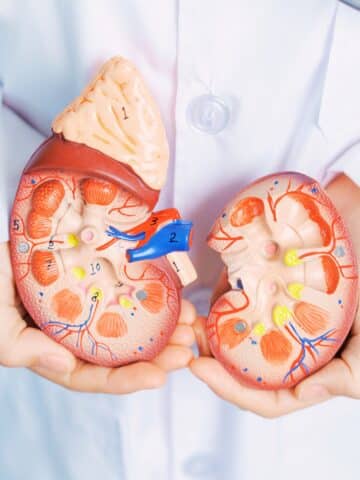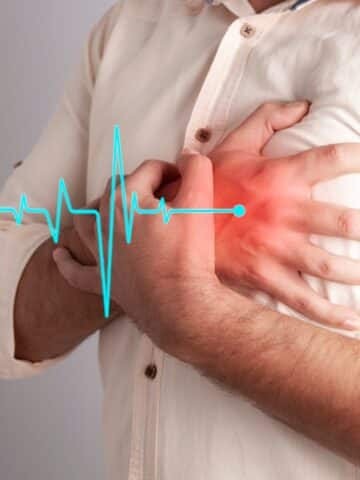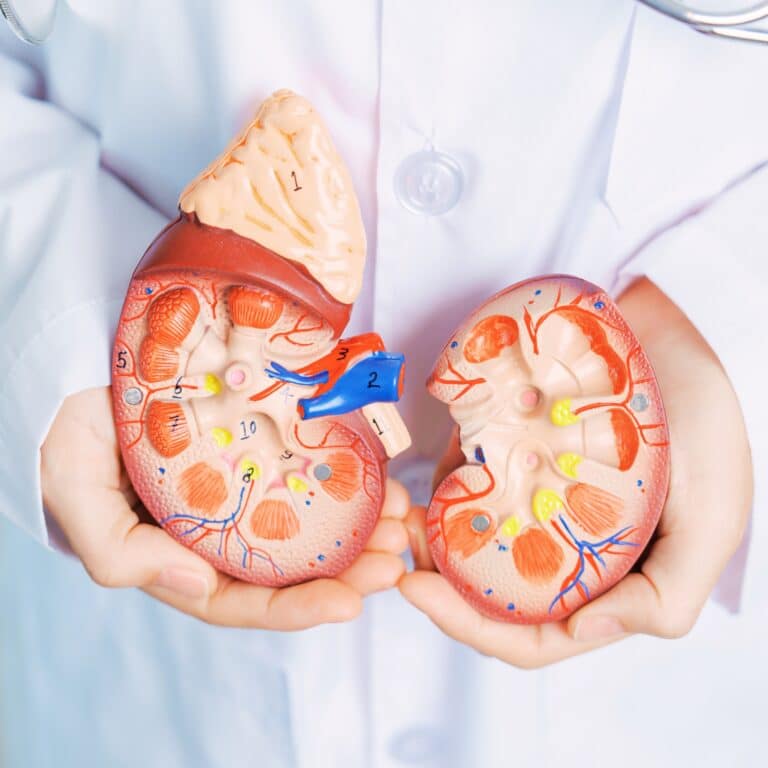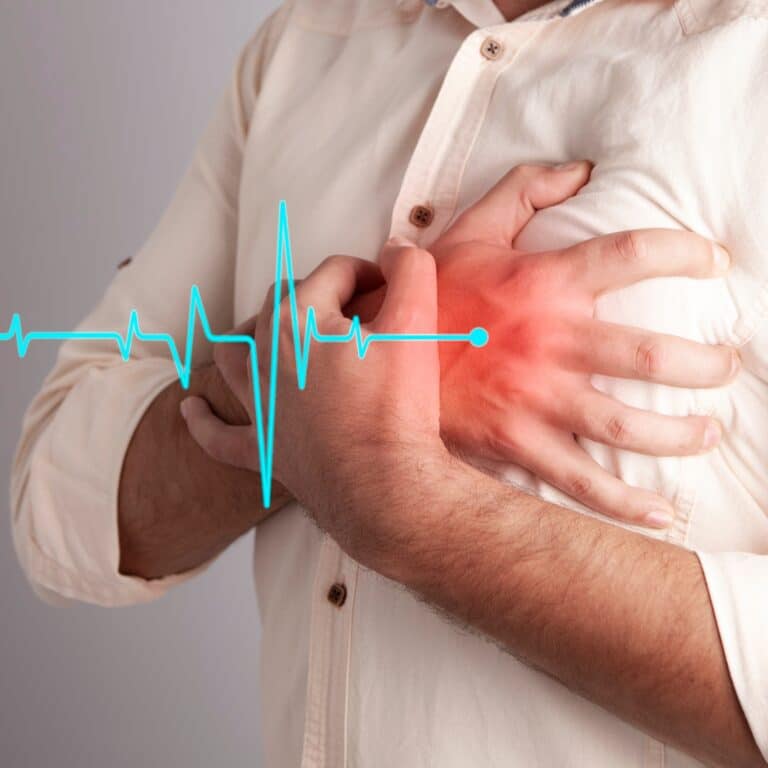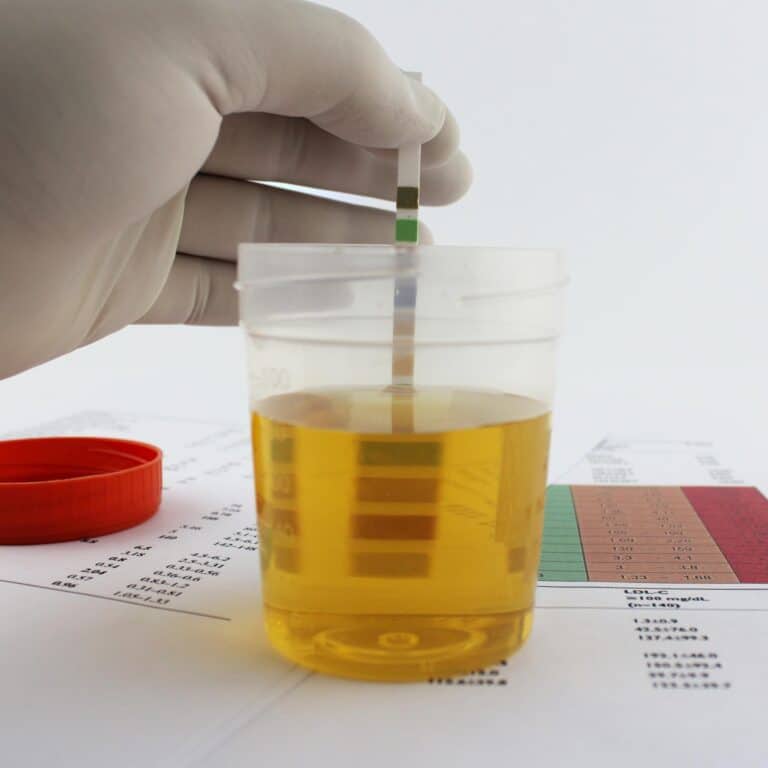RDHQ Podcast 111: What Are Symptoms of CKD For Kidney Patients - Renal Diet HQ1
Hey, everybody! It's Mathea Ford, with Renal Diet HQ. Happy Veterans Day! I wanted to thank you all for your service, to my fellow veterans.
I think it's just a great day to kind of reflect on all the ways that service to our country is a good thing, and I wanted to go live today and talk about symptoms of kidney disease I have Natalia from RenalMate. She's going to join me here in a few minutes. But, hey, I'll show you real quick, the reason why I joined the army was to be a dietitian. If you can, if that's not,there's my ring light showing in the background.
So that's me getting my certificate at the end of my internship when I was a Second Lieutenant, and so I was a Dietitian in the army for about five years, and I really,really enjoyed my time and I learned so much. So, thanks to everybody who's joining us.
Hope you're having a great day!
Let's see, kidney health interview.
Mathea: Hey, Natalia!
Natalia: Hello, Mathea! Great to see you.
Mathea: Great to see you! My first time doing the live with somebody and I'm in charge of getting you to join. So, thanks for being part of it today. We were just talking about Veterans Day. Saying thank you for everybody for my fellow veterans for their service, and how valuable that is to our country.
Natalia: Absolutely! And thank you for being part of this amazing contribution. Happy Veterans Day, Mathea.
Mathea: Thank you, thank you.
Hey! So, today we're going to talk about symptoms of kidney failure. I know that that's something that a lot of people have questions about, and you're going to kind of go through and I'm going to answer the questions I was going to let you kind of ask some questions that you get a lot that are common.
Natalia: Absolutely, and I'm very thrilled about this conversation because on one side, we want to share more awareness about kidney disease detection, but also helping patients and people who have already kidney failure or kidney disease to understand better their symptoms. To speak better with their dietitian or doctor to manage those symptoms because those can certainly cause disabilities and decrease the quality of life.
So, first of all Mathea, there is this big uncommon way of diagnosing kidney disease that many symptoms are invisible. And for many people who are less familiar with kidney disease they assume the kidney disease diagnosed through having pain in a kidney region or having some kind of urinal flow change. Could you explain how to approach and look into the kidney symptoms, and how does those occur in our body?
Mathea: Well, I think you made a very good point it can be a very silent disease, much like high blood pressure can be as silent. Something that, you know, we just have it we don't realize that we have it. You really don't have a change in your urine flow, you don't have a change in the concentration, until very late in the disease.
So, some people say, "oh! I have foamy urine." That can be extra protein in your urine but that doesn't always happen, that's not always an indication. So, I think It's important to understand that if you're at risk for having kidney failure, if you have PKD, if you have heart disease, if you have diabetes, high blood pressure, that you need to be tested on a regular basis with your doctor, and just keep up with it, and they probably aren't going to remember to test you. You're going to have to be the one that says, you know, "Hey, I need my yearly test."
So, yeah! So, it is not, it is a silent disease and like I mentioned last week,you know, people have it but up to only about 15% of people who have it know they have it, so there's a lot of people out there who have undiagnosed kidney disease and the earlier you catch it the better.
Natalia: We see one of the comments, Anthony from UK he's joining and he's saying that it's very true, when my kidney failed there were no warning signs. Yeah. So, hopefully today we'll shine some light around the common symptoms and things that may feel and less commonly we assume they're not the symptoms of kidney use, but they actually are.
So, first of all let's speak about people in a high risk of developing kidney disease, how do they actually can get tested and if there are any ways to actually get tested at home, before you see your doctor, even?
Mathea: Well, yes. There are some ways, they have some strips that you can use to test your urine for protein and glucose. So, if you have diabetes you may be familiar with testing your urine occasionally for glucose. They also have test strips that test for protein. It's not, that's not always going to be... that's not always going to be the issue, but you certainly can test if you're at higher risk.
So, who is at higher risk? The older older you age, having high blood pressure,having family with kidney disease, or having like diabetes, PKD, or heart disease. Those all make you more susceptible to having kidney failure, and like I said before, the earlier you catch it the better.
Typically, you're gonna want your doctor to check your eGFRs, is what it's called Glomerular Filtration Rate, and they do that with a blood sample. They're going to draw blood, and they're going to check your creatinine, and then also as part of that there's a calculation that they use and they take into account your age, your ethnicity, your weight, and male, female, and then they come up with a number that's your estimated Glomerular
Filtration Rate when it gets below a certain point,you get into the stages of kidney disease.
So, if you are in one of those higher risk categories or you have a family member who has kidney disease, you just probably want to have your doctor check it at least once a year, just to keep up and you can see if it's starting to trend as an issue. Because like we said in the beginning, you're not really going to have symptoms.
Natalia: So, we'll talk more about the lab specifically what to look up when kidney progress. But, speaking about people who have been diagnosed with kidney disease and already on a way to kidney failure, they may experience various symptoms, and more like a such a self-check. One of the common ones are fatigue, cramps, so I would like us to go over each of the symptoms and understand the differentiation between them.
Mathea: Yeah. So, I think the most common one is fatigue, like you mentioned. So, it's not, like exertion specific. It's not like, I walked a mile and now I'm tired. It's just a general constantly feeling tired.
So, it's not a shortness of reath,it's not that heart you know like a chest pain or anything like that. This is more like just not wanting, having a hard time getting out of bed, having a hard time having energy to do certain things, having a hard time and it and it's very non-specific which makes it even more difficult to you know associate, but just if you do have kidney disease this is typically something that's going to happen.
Fatigue is thought to be sometimes caused by anemia, which is a problem that you have when you have kidney disease. You can have low red blood cell counts, low iron. So, you can have anemia. Having anemia makes you tired. That's one of the big symptoms of anemia. So, having that is something that a lot of people notice. So, if you're at risk and you feel tiredness all the time, just that very non-specific tiredness then have, you might have that looked at you're gonna have your doctor do lab draws or whatever. That would be my thoughts on fatigue.
Another one is muscle cramps. So, sometimes people will have like we used to call them Charlie Horses, but they're kind of in your legs a lot and usually at night, and there is not a..., again, and not a specific thing about kidney disease that causes leg cramps or muscle cramps. But, it's probably something along the lines of potassium irregularities, your kidneys manage potassium, they may have different amounts of potassium levels in their blood.
So maybe when you lay down those you know, your potassium is redistributed. I don't want to get into that because I'm not a medical doctor. But, some of it may be potassium, but a lot of it is just generally specifically, you just have muscle cramps and you know, dietary treatment helps that.
Following a kidney disease low protein low sodium diet can really help some of those symptoms, but those are the first two kind of that I thought of. Let me see.
Loss of appetite, so as you progress in kidney disease you have limits on your protein intake. So more as you get further along stage three, stage four, stage five, we gradually reduce the amount of protein that you're taking in, and a lot of times because you have a buildup of waste product in your blood, urea, nitrogen, and other things causes that appetite you just nauseous, you may have vomiting and you just generally lose your appetite, you don't want to eat. So, you kind of, it's kind of double whammy because you want to do as much as you can to maintain your health and to be as healthy as possible while trying to manage your disease, but if you go on dialysis you also want to be healthier going on to dialysis, because that leads to better outcomes with dialysis.
So, you will as you progress to stage four, stage five, have loss of appetite have nausea vomiting. That's pretty common, also common to have to develop an aversion to meet, I don't know that they know what causes that either, but a lot of people can have some easy bruising, and i think that's just related to overall your body kind of having a hard time managing with the being out of sync with your homeostasis.Your normal rates are kind of out of whack, so your body just becomes more sensitive, and I think that leads to some extra bruising.
What else Natalia?
Natalia: Well, I think also the common one later in stages of kidney progression kidney disease progression also the shortness of breath, yeah and that actually could be ambiguous because it could be warnings of excessive fluid, versus say it could be more like shortness of breath when doing a walk or going upstairs. So could you explain a little bit more how to read that symptom, and what does a warning signs of those?
Mathea: Definitely, if you have shortness of breath, that type of shortness of breath on exertion. You know, walking up to four or five stairs and you're having a hard time breathing certainly a time you need to contact your doctor go to emergency room because that's a very strong sign of a heart attack. So, the shortness of breath is thought to be related to the heart disease that a lot of people have that causes them to later have kidney damage.
So, you may have, you know, you may have some shortness of breath and tiredness also because of the anemia. You know, you may just again the fatigue, just it all, kind of compounds as it gets a little worse and again some people have none of this and they're suddenly diagnosed.
But, another thing I thought of is people a lot of times get itchy dry skin, so they have if as you progress, stage four, stage five, you lose over about 80% of the kidney function.
They start to have itchiness just kind of all over their body and it helps to do lotion, and it may be the mineral imbalance, you know, the excess waste products, but that is another thing that happens unfortunately, and all of this is improved with diet. It's not necessarily, you know, get rid of these symptoms with diet but it's certainly it's easier to tolerate easier to handle with that.
Natalia: Well, I wanted to add also just through the podcast interviewing younger patients who have been crushed into renal failure, many of them had migraines or side vision issues, blurrer vision without having any diabetes or predisposition, so sometimes warnings and science could be nothing related to kidney, but they could be recurring and usually they are escalating and increasing in our strengths.
So those could be also some signs. Are there any other symptoms you see that may be less common but could be a good other example?
Mathea: So, sometimes people get insomnia they have restless leg which kind of relates to the leg cramps you know, kind of that leg stuff. Muscle tensions, yeah. Yeah, and memory loss and some tingling numbness in your hands related to the nerve damage from the imbalance. It looks like Anthony or Aunt Gravestock said, "yeah I itched a lot," and he was on dialysis he or she, and they got a different filter, but yeah, itchiness is a big deal on dialysis seems to happen, because of the mineral imbalance that happens. But, I would say those are kind of the more common and they don't even always correlate with your lab tests, so just because I said that, you know, around 80% kidney failure you start to experience these things, you may not experience them, you may experience them sooner.
There's no cut and dried way that they show up, but certainly if you're at risk and you know you have lupus or anything else you need to be checked for this, so that you're catching it as soon as possible because the sooner you can catch it the faster the more you can manage it and prolong the the length of time in stage three, stage four, prior to dialysis.
Natalia: Oh, great!
Mathea: Sometimes you can get symptoms that improve and then they come back later, so that's unfortunate.
Natalia: So I want to remind our audience, thanks so much for joining this HD live and our recorded video. Write in comments symptoms that you have experienced being diagnosed with CKD or End-Stage Renal Disease, and also if you're on dialysis shares the symptoms you're experiencing that common knowledge is very important, and I already have some other comments such as calcification.
Mathea: So, calcification happens, I know last time we talked a little bit about vitamin D and this can be a very complex process and again I'm not you know, I do have a course on labs that goes into great detail at RenaldietHQ.com. You can use a coupon code iglive to get $20 off, and I'll put the comment. in the comment.
So, calcification what happens is your kidneys manage Vitamin D, Calcium, Phosphorus, Potassium levels in your blood. So, as our Vitamin D levels go down, you don't absorb as much calcium from our food, because Vitamin D helps across that intestinal barrier to absorb calcium. So, when you don't absorb as much calcium our body still needs calcium in your blood to perform functions like, your heart requires calcium to do that pumping, to do muscle contraction. So, when you have less calcium available through your food whether you're eating it or not, your body does absorb it. Then your body says, "well, we've got these bones. We'll just start taking calcium out of the bones."
And that is a survival mechanism and it's what's supposed to happen. But then your excess calcium can sometimes be deposited in soft tissue which is calcification. So, you have a long time that can happen but it's called Mineral Bone Disease and it's a complex process. It takes... it kind of happens over a period of time but the better that you manage the Vitamin D at the beginning, where are you keeping your Vitamin D levels up so that you're continuing to absorb the calcium that you need and manage your phosphorus, then the lower issues you have with it but it still can happen.
Calcification is something that is something that you should be aware of certainly, and it can start as a lot of people think about it with dialysis patients but it can start as early as stage four, stage five.
Natalia: Right, that's a mineral overload and control of phosphorus is so important for dialysis patients just to follow up on this as a use of phosphorus binders. Are those also part of management of calcifications for dialysis patients?
Mathea: Yeah, it is phosphorus binders reduce the phosphate that you're absorbing. And, so, in your blood, again, I talked about your body wanting to keep this homeostasis but your body wants to keep a certain amount of calcium and phosphorus levels in the blood. So, when you have more phosphorus your body wants to have more calcium to balance that out, because it's trying to achieve a certain amount of, it just has a set point that it's trying to keep you know within .1, or .05, or whatever specific is to that item for example, your blood pH.
So your blood ph is around 7. I think it's 7.35 or something. So as you, when you get more calcium your pH changes so then your body tries to do something else to improve that to get that pH back to where it's supposed to be.
Natalia: Yeah, thanks for this clarification since we have number of people on dialysis, especially some of them have been, five and more years on dialysis and sometimes it's important to go over again some of those symptoms and better understand how to manage them. So, as you were explaining that the labs play a significant role of looking for the progression of kidney disease but also really keeping the understanding are things in balance in a body for someone who goes through surgery or CKD.
It's important for patients to be very well aware what may change in their labs and impact their symptoms. So if you can share a little bit more about anemia and albumin change in a lab that can also impact the symptoms that patients experience.
Mathea: So, anemia the symptoms in addition to being fatigued, you know, you can get cold really easy and you could feel weakness, but your level of blood of your hemoglobin in your body, is again improved by that erythropoietin which is produced by your kidneys which is a hormone. So, as you progress in kidney disease and your kidneys have harder time making their atrophies, you're gonna have lower amounts of red blood cells being generated and therefore have anemia which then leads to fatigue.
So, doctors, you should be on your doctor to try to manage your anemia. But there is a certain amount of like say, it's like I think it's 12.5 is like the lower end of normal for the hematocrit and what they try to do with people with kidney disease is they found that trying to get back to 12.5 is probably causing more damage sometimes than it is improvement. So, they try to get you back to like 11, 11.5, to relieve your symptoms, but you also asked about other labs like albumin.
So, albumin is one of those things that we want to try to keep in a good number, especially as you enter dialysis the better your albumin level is the better people do on dialysis initially. So, the albumin is, it used to be kind of a measure of protein status, we now kind of as a dietitian we kind of think of it as a inflammatory response, and so the more inflammation you have in your body which is gonna happen as you have these imbalances we'll call them, in your body.
So, as you have those, as you progress in kidney disease, you're gonna have these imbalances and the abdomen levels are gonna go down. So, it's not always 100 related to protein, it is a protein in your blood and we used to think it was a good measure of nutritional status, but we don't think that anymore. There are other measures that are better,but albumin is a measure of inflammation and I know we're going to talk at inflammation at some point in this series that we're doing.
But just know that and the more you can reduce inflammation the better. So your doctor's going to look at when you're thinking about getting like reviews just tested over time to see if you're developing kidney disease. They're going to look at that GFR which I explained a little bit ago. They're also going to look at something called an ACR which is an Albumin to Creatinine Ratio which is in your urine. So, they can check that
and usually it's a lab test, it's not always a dipstick because if they just do a little dipstick that only measures at like a hundred which is a pretty high number, so they can measure that other levels in a lab test, but they're going to look at that.
So, those two things together your eGFR and your ACR are going to tell them what your stage of kidney disease is and then kind of how fast it's going to progress. So, those are some of the labs that they really look at to initially diagnose you, and then I know we'll talk more in this future things about the diet, but just know that you can manage the symptoms and slow down the progression of your kidney disease if you improve your diet.
Natalia: So, this is such an excellent point yeah about acknowledging people that many of the symptoms that you experience on a daily basis certainly can be managed, and speaking with a dietitian and your doctor is important in early days of experiencing those symptoms.
So, let's go over some comments, because I think you start reading and want to share more. Yeah.
Mathea: So, what comments were you looking at?
Natalia: So, one question I have additionally, we've been asked ahead of her time about a hyperthyroid and for many ESRD patients have hypothyroid become this complex issue that they have hard time understanding, and also they have various symptoms they're not sure whether those come from the hyperthyroid or ESRD itself.
Mathea: Yeah. So, hyper thyroid is too much as high levels of thyroid in your thyroid stimulating hormone in your blood, and then hypo is too little thyroid stimulating hormone in your blood.
Hyper can cause you to be nervous, and irritable, and it also can cause fatigue which I already said in the beginning, fatigue is one of the big issues. And it can cause you to be cold hyper you know that heat intolerance that I think is also associated with anemia sometimes. And then, you have trouble sleeping and some tremors which can also you can have trouble sleeping insomnia with kidney disease.
So, they're kind of intermixed and I know that it can be you know, related conditions that people have especially with hyperthyroid. So, I, you know my answer to that is obviously there's a connection between your kidneys and your thyroids and you need to get the medication that you need to get that rebalanced because neither way is good.
So, it's not good to have too much thyroid and it's not good to have too little, you want it, again, that homeostasis you want it to kind of be in the middle where you have the right balance, because our thyroid affects your parathyroid as well.
Parathyroid is what stimulates your body to take extra calcium from your bones, so it can be a big part of that calcium metabolic bone disease that people get with kidney disease. I don't know how much that answered but it there can be similar
symptoms.
You know, having a good relationship with your doctor, talking to your doctor, and honestly today we almost have to do research and come in with some ideas or thoughts about what might be the issue, I don't ever recommend diagnosing yourself using Dr. Google, but you certainly can go into your doctor and "I am having, I'm really tired, I'm irritable, I'm cold all the time. I looked up some things and it says that I might be hypothyroid.
Can we check that?" That's an easy check to do.
And if your doctor doesn't want to check that then you may need to look into your relationship with them and how they're, you know, how to talk with them like why is that something that you don't want to do, but I don't know why your doctor wouldn't go ahead and check your thyroid.
Natalia: And now, the final question I have certainly with the management of the lifestyle, possible to improve some of the symptoms and manage them better to have bright life around them, because certainly fatigue muscle cramps could be decreasing quality of life and core and actually, you know, losing productivity.
Mathea: And maybe disabling, yeah.
Natalia: Yeah, so what are your recommendations? I know in future series we'll talk more about it, but specifically such as being Renal Dietitian, have you seen that change in diet could help to resolve or help to decrease impact of those symptoms on quality of life?
Mathea: So, definitely, when you can bring your diet improvement, so, diet will slow down the progression of kidney disease I can say that without any reservation. It will help you if you're on dialysis, it will help you with your pre-dialysis, but your diet is going to be in combination with understanding what else is going on.
So, if you have anemia eating more iron rich foods is a good thing but also taking whatever medication your doctor prescribes, if they want you to have EPO, if they want you, to you know, take an iron medication, checking your Vitamin D levels, checking your different potassium levels.
Honestly, a lot of people start with wanting to not eat potassium and phosphorus and really if your stage three, stage four, where you need to start is controlling your diabetes controlling your heart disease through medication and through diet and then also managing a protein, so eating a lower amount of protein and eating a limited amount of salt.
So, it's never, you shouldn't start with throwing out all the fruits and vegetables. You should start with limiting the amount of protein and then limiting the amount of salt and controlling your diet for, you know, if you're diabetic managing your sugars, if your heart disease managing your cholesterol, manage your blood pressure, and then checking those other levels.
So, when you have your salt level in your blood is not going to be indicative of the amount of salt that you ate because again, your body is at home doing homeostasis so your body is taking in salt and it's eliminating salt through your kidneys. So, your body's going to keep your salt level at a certain amount, your body's going to keep your potassium level at a certain amount in your bloodstream.
So, research has shown that you don't need to limit your potassium intake until you have potassium levels in your blood that are elevated. So, when it becomes elevated that means your kidneys are having a difficult time managing those, so you need to help by limiting your potassium, but the less restrictions you can place on your diet as time as you progress is healthier just because it's easier when you have a bigger variety of food.
Natalia: Yeah, and I just want to repeat it again that for people who have been diagnosed with kidney disease and go on Google and find that a low potassium low cell protein diet is the way to go, it's not true for everyone and it's only could be prescribed by after taking labs, understanding the stage of kidney disease, understanding lifestyle of someone whether they have other underlying conditions, such as diabetes and only then certain diet restrictions may be prescribed or not.
So, this is so important just to make sure you don't go online and just adopt whatever the first article pops up.
So that's why we designed this session and we planning the next follow-up ten sessions to speak with Mathea about various ways to protect your kidney and prevent dialysis, and also improve quality of your life while you're already, you know, going through dialysis and preparing to have a better quality of life or preparing for your transplant.
Mathea: Absolutely! So, thanks for... Go ahead.
Natalia: Oh yeah so actually I would like to ask you Mathea to summarize today's conversation since we spoke about various things around the symptoms, and been Renal Dietitian for over 20 years. You're very resourceful but if it was one thing to take away from today's conversation please share with our audience.
Mathea: Well, I would just say when you're thinking about symptoms, you're not necessarily going to have a prescribed symptoms, you're not always going to be fatigued, you're not always going to have certain things. So, the big takeaway is if you have these related conditions, you have family history, if you have PKD, if you have heart disease, if you have diabetes,or if you have some sort of predisposition to having kidney disease. You want to have your levels, your eGFR, your ACR, and other, you know, Vitamin D level checked on a regular basis so when you start to go into stage two, stage three, you're able to start making the dietary changes that you need to make.
So that to me the biggest takeaway. Yes, you can have fatigue and it can be lots of different reasons, you can have restless leg, you could have muscle cramps, you can have, you know, tiredness, and you can have the loss of appetite, you can have nausea vomiting, itching, you know, all those things. But, when you're thinking about it you just need to make that you're working with your doctor to say, "hey, I'm at risk for this are we checking this and I want to have that on the schedule and be checked regularly for it, whatever is reasonable to me," you know, it's once a year, every six months, depending on how your condition is to what your risk is.
Natalia: Excellent! Just the last question we have on the comment bar, if you want to address or we can address this important decision where-did-that-motor says, "I have parathyroid high level I'm kidney transplant, should I make remove it by surgery?"
Mathea: That is something I cannot discuss, so I would say definitely talk to your doctor and and when you're talking to them ask about the positives and negatives. "What is removing my parathyroid? What is going to happen? What medicines am I going to have to take? How is it going to affect my kidney?"
You're taking different medications when you have a kidney transplant and you know, some of those medications can affect your parathyroid but yeah you definitely need to discuss that with your doctor, and maybe your nephrologist, or maybe your transplant doctor, whichever one you're seeing but just see what their opinion is on it.
Yeah, I couldn't. Oh yeah, I couldn't, sorry. Yeah, but definitely parathyroids are something do want to manage. Yeah.
Natalia: Absolutely! Thanks so much Mathea. Appreciated your time and once more thanks so much for the audience joining us today.
Mathea: Yes! Thank you, guys, great questions.
Natalia: And the last but very important thing Mathea, Happy Veterans Day. Thank you so much for your service.
Mathea: Thank you guys. Thank you for the fellow veterans out there who are watching this later and feel free once it's posted in live I'll post it in IGTV, feel free to ask whatever questions you'd like, thanks guys!
Yeah, thanks. Talk to you next week. Thanks for the invitation. Bye. Bye.


